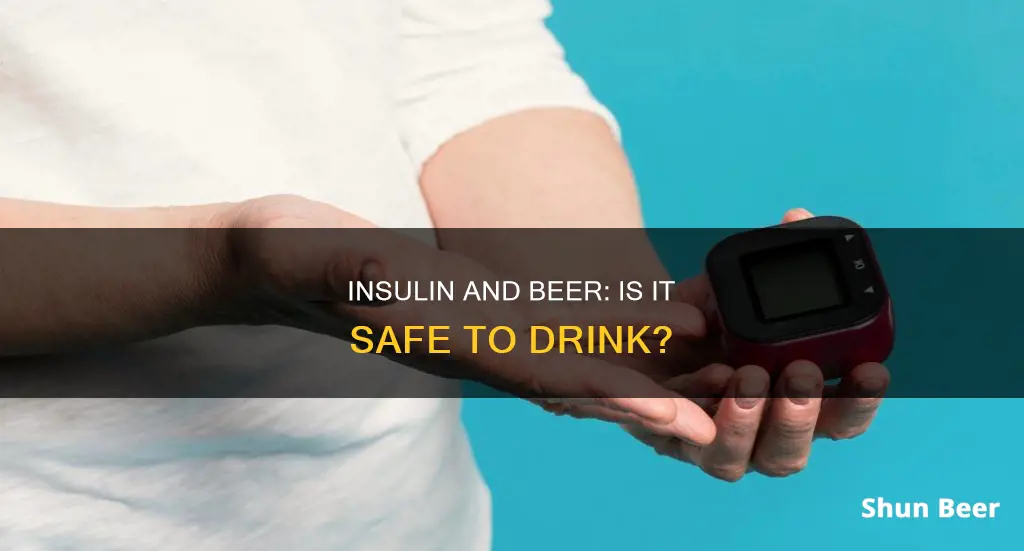
Alcohol and diabetes is a complex topic. While people with diabetes do not need to cut alcohol out of their lives completely, there are some important safety considerations to be aware of. Alcohol can interfere with blood sugar levels, and for those taking insulin, this can lead to a dangerous drop in blood sugar, or hypoglycemia, up to 24 hours after drinking. This is because the liver, which is responsible for converting glycogen to glucose when blood sugar levels are low, prioritises metabolising alcohol over this process. As such, it is important to never drink on an empty stomach, and to monitor blood sugar levels before, during, and after drinking.
| Characteristics | Values |
|---|---|
| Can I drink beer while taking insulin? | Yes, but in moderation. |
| Safe amount of alcohol | No more than one drink a day for women and up to two drinks a day for men. |
| Safe drinking guidelines | Never drink on an empty stomach; monitor blood sugar levels; choose drinks wisely; drink slowly. |
| Alcohol's effect on blood sugar | Alcohol can cause blood sugar levels to drop, increasing the risk of hypoglycaemia. |
| Alcohol's effect on the liver | Alcohol impairs the liver's ability to make glucose when blood sugar is low. |
| Alcohol's effect on weight | Alcohol can lead to weight gain, which can contribute to the onset of type 2 diabetes. |
What You'll Learn

Alcohol lowers blood sugar
How Alcohol Lowers Blood Sugar
When you consume alcohol, your liver's priority is to metabolise and get rid of the toxins from your body. As a result, it temporarily stops performing other functions, such as converting glycogen back into glucose and releasing it into the bloodstream to regulate blood sugar levels. This interruption in the liver's normal functioning can cause blood sugar levels to drop for a couple of hours, or even a whole day.
Risks of Drinking Alcohol While on Insulin
Drinking alcohol while taking insulin or managing diabetes requires a cautious and individualised approach. Excessive alcohol consumption can cause a significant drop in blood sugar levels, increasing the risk of hypoglycemia. Additionally, the symptoms of hypoglycemia, such as confusion, dizziness, and fatigue, can be easily mistaken for intoxication, making it challenging to recognise and treat low blood sugar levels promptly.
Safe Drinking Guidelines for Diabetics
If you have diabetes and choose to drink alcohol, it is crucial to follow specific guidelines to minimise the risks:
- Never drink on an empty stomach. Always consume alcohol with food to slow the absorption of alcohol and maintain blood sugar levels.
- Monitor your blood sugar levels before, during, and after drinking. Check your blood glucose levels before drinking to ensure they are not already low, and continue to monitor them for up to 24 hours after your last drink.
- Choose your drinks wisely. Avoid sugary mixers, sweet wines, or liquor mixed with sweetened soda or juice. Opt for liquor mixed with club soda or water, dry wine, or low-carb beer.
- Drink slowly and in moderation. Take small sips, and alternate your alcoholic beverage with water. For women, moderate drinking means no more than one drink per day, while for men, it is up to two drinks per day.
- Wear a medical alert ID and inform your companions: Let others know that you have diabetes, and make sure to carry hypo treatments with you.
Beer and Low FODMAP Diet: What's the Verdict?
You may want to see also

Drinking can increase the risk of hypoglycemia
The liver is responsible for converting glycogen, a stored form of glucose, back into glucose and releasing it into the bloodstream when blood sugar levels dip too low. However, when alcohol is present in the body, the liver prioritizes metabolizing and eliminating it, which means it is less able to regulate blood sugar levels effectively. As a result, blood sugar levels can remain low, leading to hypoglycemia.
The risk of hypoglycemia is particularly high for people with diabetes who are taking insulin or other medications that lower blood sugar levels. Alcohol can also cloud judgement, so people may not realize that their blood sugar is dropping to dangerous levels. Additionally, the symptoms of hypoglycemia, such as confusion, dizziness, and irritability, can be similar to the symptoms of intoxication, which can make it difficult to recognize and treat low blood sugar.
To reduce the risk of hypoglycemia when drinking, it is important to follow certain safety guidelines. These include never drinking on an empty stomach, monitoring blood sugar levels before and during drinking, choosing drinks with lower sugar and carb content, and drinking slowly. It is also important to inform others that you have diabetes and to wear a medical alert ID in case of an emergency.
While drinking can increase the risk of hypoglycemia, moderate alcohol consumption may have some benefits for people with diabetes. Some studies suggest that moderate drinking may be linked to a reduced risk of heart disease and improved management of blood sugar levels. However, it is important to note that excessive alcohol consumption can have negative effects on health and may increase the risk of diabetes-related complications. As always, it is best to consult with a healthcare professional to determine what is safe and appropriate for your individual needs and circumstances.
Colorado EBT and Beer: What's the Deal?
You may want to see also

Alcohol interferes with the liver's ability to regulate blood sugar
The liver is one of the most complex organs in the body, with several important functions, including regulating blood sugar levels. When you drink alcohol, your liver has to work to break it down, and this interferes with its ability to regulate blood sugar.
The liver breaks down alcohol into several by-products, including acetaldehyde, which is highly toxic to the body. This process also produces highly reactive molecules called free radicals, which are believed to cause much of the direct cell damage that occurs during alcoholic liver disease.
When the liver is busy dealing with alcohol, it is less able to perform its other functions, including regulating blood sugar. This can lead to a dangerous drop in blood sugar levels, which can last for several hours or even a whole day. This is especially risky for people with diabetes, as they are already at risk of hypoglycemia.
Drinking alcohol can trigger a hypoglycemic episode, and the symptoms of hypoglycemia—such as confusion, dizziness, and irritability—are very similar to the symptoms of intoxication. This means that someone drinking alcohol while taking insulin might not realize that their blood sugar is dangerously low and may need medical attention.
To prevent hypoglycemia when drinking alcohol, it is important to never drink on an empty stomach and to monitor blood sugar levels closely. It is also important to be aware of how much you are drinking and to pace yourself.
Beer and Advil: Safe Mix or Health Risk?
You may want to see also

Drinking on an empty stomach is not recommended
If you are drinking alcohol, it is important to eat beforehand and to monitor your blood sugar levels. You should also be aware that the symptoms of hypoglycemia can be similar to those of intoxication, so you may not realise that your blood sugar is low. It is recommended that you wear a medical alert ID that states you have diabetes, and inform those around you, so that they can get help if needed.
It is also important to note that alcohol can affect your weight, as it contains a lot of calories, and can lead to raised blood pressure, nerve damage, dehydration, and sleep disruption. It can also increase the risk of certain cancers and heart disease. Therefore, it is important to drink in moderation, and to be aware of how alcohol may affect your body.
If you are taking insulin, it is best to discuss drinking alcohol with your healthcare provider, as there are numerous factors that determine the safety of drinking alcohol while taking insulin. These include your overall health status, your blood sugar management skills, and any other medical conditions you may have. Your doctor can advise you on whether it is safe for you to drink alcohol, and how much is safe to drink.
Beer Drinking in Oklahoma: Sunday's Special Rule
You may want to see also

Alcohol can affect your weight
Secondly, when alcohol is consumed, it is burned by the body as a fuel source before carbohydrates or fats, leading to excess glucose and lipids being stored as fat. Alcohol also inhibits fat oxidation, which could lead to higher body fat levels over time.
Thirdly, alcohol can affect your liver, which plays a crucial role in metabolising fats, carbohydrates, and proteins. Excess alcohol consumption can lead to alcoholic fatty liver, which can damage your liver and affect how your body metabolises and stores these nutrients.
Additionally, alcohol can affect your hormones. It has been linked to increased levels of cortisol, a stress hormone, which can lead to abdominal weight gain and increased cravings for high-calorie foods. Alcohol may also trigger hunger signals in the brain, leading to an increased urge to eat.
Finally, alcohol can negatively impact your sleep quality and duration, which is also linked to weight gain. Poor sleep can disrupt hormones related to hunger, satiety, and energy storage, making it harder to control your weight.
While light-to-moderate alcohol consumption may not directly cause weight gain, heavy drinking is more consistently associated with weight gain. Therefore, reducing your alcohol intake may support your weight loss efforts.
Fitbit Beers: Compatible with Pixel 2?
You may want to see also
Frequently asked questions
People with diabetes do not need to cut alcohol out of their diet. However, there are some important safety considerations. Alcohol competes with your liver’s ability to make glucose when your blood sugar is low, which can lead to dangerously low blood sugar up to 24 hours after you stop drinking. Alcohol can also cloud your judgment, so you may not realize that your blood sugar is low.
If you are taking insulin, it is recommended that you never drink on an empty stomach, monitor your blood sugar levels, choose your drinks wisely, and drink slowly.
Drinking alcohol while taking insulin can lead to hypoglycemia (low blood sugar) and mask its symptoms. This is because the liver prioritizes getting rid of toxins before it converts glycogen back into glucose, so blood sugar drops until the alcohol is out of the blood.
The symptoms of hypoglycemia include confusion, dizziness, irritability, headache, and fatigue. These symptoms are very similar to the symptoms of intoxication, so it may be hard to tell the difference.
If your blood sugar monitor shows that your blood sugar is less than 70 milligrams per deciliter (mg/dL), you will need to consume 15 grams of fast-acting carbohydrates. This could be three or four glucose tablets, 4 ounces of juice, or five pieces of hard candy (not chocolate).







